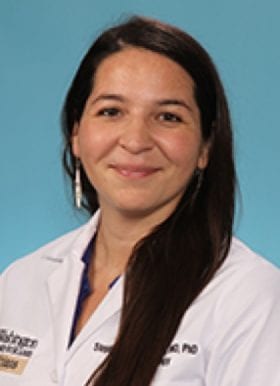
Education
- Baccalaureate, Biology: Washington University in St. Louis, St. Louis, MO (2001)
- PhD, Cellular and Molecular Biology: University of Wisconsin Madison, Madison, WI (2008)
- MD: University of Wisconsin School of Medicine & Public Health, Madison, WI (2010)
- Internship: Medical College of Wisconsin, Milwaukee, WI (2011)
- Residency, Radiation Oncology: Barnes-Jewish Hospital/Washington University School of Medicine, St. Louis, MO (2015)
Board Certifications
- Certified by the American Board of Radiology in Radiation Oncology (2016)
Recognition
- ASTRO Junior Faculty Career Research Training Award: American Society for Radiation Oncology (2016)
- Roentgen Resident/Fellow Research Award: Radiological Society of North America (2015)
- Resident Clinical Research Award: American Society for Radiation Oncology (2014)
- Resident Research Award: Radiological Society of North America (2014-2015)
- Conquer Cancer Young Investigator Award: American Society of Clinical Oncology (2014-2015)
Clinical Interests
Cervical Cancer
Uterine Cancer
Ovarian Cancer
Thyroid Cancer
Vulvar Cancer
Choroidal Melanoma
Biography
Stephanie Markovina, MD, PhD, is an associate professor of radiation oncology. Dr. Markovina earned her PhD in Cellular and Molecular Biology from University of Wisconsin, Madison in 2008 and her medical degree from the University of Wisconsin in 2010. She is a physician scientist who joined the faculty in 2015 after completing a residency in radiation oncology at Barnes-Jewish Hospital/Washington University School of Medicine. Her clinical practice and research interest are treatment of gynecologic and thyroid cancers, and identification of novel metrics to serve dual purpose as biomarker for prognosis and response to radiation therapy and as targets for novel therapies.
Research
Dr. Markovina studies novel metrics to serve dual purpose as biomarkers for prognosis and response to radiation therapy, as well as therapeutic targets for human solid tumors such as cervical and anal cancers. She studies the role of Squamous Cell Carcinoma Antigen (SCCA), a member of the SERPIN superfamily, and its role in tumor cell resistance to radiation and chemotherapy. Her lab is investigating the role of the lysosome in tumorigenesis and response to anti-cancer therapies. Research goals ultimately are to better stratify of patients prior to initiation of treatment, or early into treatment will allow individualized precision therapy for patients and ultimately better outcomes. Dr. Markovina hopes to understand the molecular role of these biomarkers in cancer pathogenesis and tumor resistance to anticancer treatments such as radiation and chemotherapy, and that this better understanding will lead to identification of novel therapeutic targets.